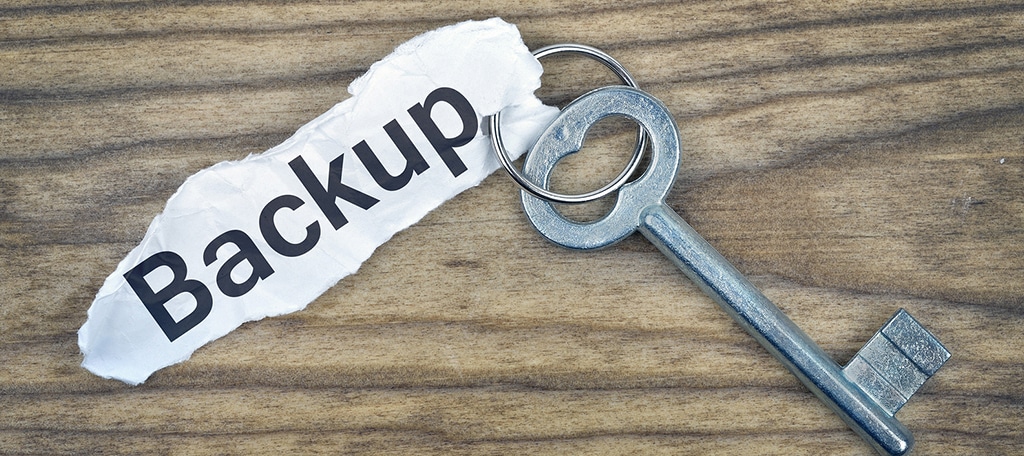
As the Internet continues to evolve and expand, keeping your data safe grows more important. It seems every year there is a new exploit or viral attack which threatens those who just want to enjoy an online experience.
For this World Backup Day, March 31, 2019, make it more difficult for the criminal element to rob you of data by backing it up.
Think of it more than just making sure important files don’t get deleted. In reality, a current backup can mean far more than just making sure you don’t lose Christmas photos or your favorite music.
What is World Backup Day?
World Backup Day is merely a global reminder to keep your data safe and secured by keeping backups. It was established in 2011 on March 31st as an annual event to send a message on the importance of keeping backup data.
Much like how we have a Cyber Security Month to promote online safety, this is about helping others prevent from being victimized. However, data loss goes beyond just hackers and bots trying to cause mischief.
Something like World Backup Day 2019 is more about spreading awareness. And the more people who understand the problem and need for creating backup copies, the better.
Why It’s Important to Back Up Data
Keep this in mind; since 2012, data loss has increased by 400%. In fact, most organizations don’t have confidence in their abilities to recover after a disaster.
According to Nationwide Insurance, at least 68% of small businesses do not have a written disaster recovery plan. So when a natural disaster such as an earthquake, hurricane or tornado strikes, most small businesses have a tougher time recuperating their losses…including data recovery.
The worst part is how 60% of businesses shut down within 6 months of a disaster after losing their data. Some things simply cannot be replaced, which leads to a lack of functionality for smaller businesses.
While there are many ways to protect your online security, regular backups are sometimes overlooked. It’s better to be overly cautious when it comes to the safety of your important files than to lose them forever.
Quick Recovery

One of the most important reasons behind keeping data backups is to make recovery easier to manage. Keep in mind that every second your business is incapable of performing a task is eating into its capacity to survive.
For example, what would happen to your business right now if an earthquake or sinkhole swallowed your building? How much of the business data would you lose?
Depending on the business, you could theoretically re-open shop in a garage or basement while recovering the backup data.
That is, as long as you store backup files offsite.
Personally, my vital business information is saved in the Cloud. Even if my computer catches fire right now, I can still continue to work from my laptop using the same files as before.
Backups help reduce recovery time as well as keeping you productive even in the worst case scenarios.
Prevents Loss

Obviously, no one wants to lose their data. Pictures, files, emails and other content influence today’s life. From keeping the business afloat to storing memories of happy moments, digital information is crucial to society today.
Having a redundant backup plan ensures most, if not all, of these files, are secure.
This loss of data comes from a myriad of issues. While most will associate data loss with hackers or bots destroying a file system, sometimes hardware just fails. In fact, about 140,000 hard drives fail each week in the United States.
By storing files other than your primary server or computer system, you’re protecting accidents from deleting valuable data.
Saves Money

An obvious aspect of keeping a backup of data is to save the business money. This could include files, images, video content, contracts, and more the business had to pay for development.
You also have to worry about downtime, employee wages and other expenses that come from not being able to sustain business practices.
Another issue you need to consider is the malicious attack from ransomware. These are nasty pieces of software that will lock down data until the owner pays a “ransom” to release it.
Smaller companies lose an average of $100,000 each time a hacker gains control of data. And this ransomware can show up on anything from a home computer to a hospital.
A lot of these expenses include the ransom itself as well as lost wages and downtime. For smaller businesses, this is devastating.
With a current backup, though, a lot of these instances are easy to recover from. Just enable a recovery process and plug the holes that let the ransomware in to begin with.
Viable Options to Back Up Your Data

As keeping backups is vital in today’s world, you have access to a vast number of methods. In fact, many companies take a lot of the work out of creating these copies for you.
From free alternatives to cost-effective hardware, there really is no reason for you not to keep a redundancy of the most important files.
Here are just a handful of methods you can use to protect yourself and your business from data loss.
Using External Hard Drives and USB Drives

External and USB drives are a common method to copy data for many. And the costs for these devices has decreased greatly over the last decade. I, myself, have a few kept around for backups of various files.
And although these devices are very useful in both personal and professional instances, they have two inescapable flaws:
- They are easy to lose. Case in point, I bought a flash drive recently that I can’t find. Luckily, it only had a few music files and images that I have saved elsewhere. But still, it’s annoying when you misplace your backups.
- Sometimes they can fail. All hardware has a lifespan. Eventually, the drive will reach its end-of-life cycle. Now sometimes you can recover data from a broken drive, but it’s often costly and time-consuming. That’s even if the recovery works to restore 100% of the files…which it often doesn’t.
I’m not saying you should abandon external devices. However, you want to keep in mind the drawbacks and prepare for the worst.
I often use external and USB drives to simply transfer files from one location to another. They work good as a backup, but I’d rather store my important files in a more resilient and accessible location.
Backups through Cloud Storage

Cloud storage methods are plentiful on the Internet. And the best part is that many of these systems are free up to a certain point. Of course, you might have to pay for larger storage capacities.
However, many of the more popular platforms offer plenty of space to at least store the most vital forms, contracts, and information for the business.
One of my favorite Cloud storage methods is Dropbox. Not only can I store files online, but it also creates redundant copies across every computer I install the app on.
Which means I can access files from my computer and they will be available on my laptop as well as through the web-browser portal.
Many Cloud storage companies will have backups of their own to ensure you don’t lose any data.
Always Have a Secondary Backup

Perhaps one of the most important data backup tips I can offer is to never rely on just a single method. Always have a secondary backup plan in case the first one fails.
Take using the USB drive, for instance. If you only rely on it as a storage location for your files and you lose it, your copy is gone and someone else could find the drive.
While it might seem a waste of time, understand that sometimes life happens. Something you thought could never fail could have a catastrophic experience.
This is one of the biggest reasons why I like using systems like Dropbox. As long as I don’t delete data from the actual Dropbox account, I can access those files even if someone drove a railway spike through my PCs hard drive.
Keeping Your Website Safe

The website is the online representation of your business. And as so much of human interaction takes place on the Internet today, you need to make sure the site is protected.
Keeping regular backups is one of many ways to keep your site safe and secure. Aside from the ransomware I mentioned earlier, some people want nothing more than wanton destruction of a site. Backups let you recover quickly in the event your site becomes a target.
This goes above and beyond eCommerce sites or business service pages. Virtually every business can benefit from an attractive website to engage customers, which is why it’s vital to make sure you back up data on a regular basis.
Server Backup Methods

Many web hosts offer generalized backup methods for websites. In some instances, this includes a nightly save of your files. The problem is that web host backups often lack a bit of control and customization.
But, it’s still better than nothing at all.
While hosted servers like this are useful, some would rather have preference over what is being stored and where. You don’t really have a lot of these options when compared to other methods.
However, it’s not a bad idea to enable the feature anyway even if you use other ways to save data. Remember, secondary backups prevent absolute loss in the event of a disaster.
CMS Backup Tools and Plugins

If you use a content management system, or CMS, like WordPress to manage your site, they often come with automatic backup methods. For instance, you can install the UpdraftPlus plugin for WordPress to save files to the Cloud.
Many of these systems are customizable and you can select what files and databases are the most important. Most will also come with an easy method to either import or recover the entire site in the event of an emergency.
The best part is some of these systems are completely free to use. Of course, some will have premium versions, but the free methods are often powerful and flexible.
If you use a CMS, it’s in your best interest to at least take a look at what methods are available. In the grand scheme of things, it’s better to be prepared than to lose everything in the event of a problem.
Using Softaculous

Some hosting platforms, such as hosting with GreenGeeks, comes with an app installer called Softaculous. This installer is probably one of the easiest ways to automatically install a CMS like WordPress or Joomla.
It also comes with its own ability to save backups.
During the install process, you can choose to enable backups and select how often they are performed. You can customize the frequency of the copy all the way down to the minute.
However, you want to be careful when setting up how often these backups are performed. They may take server resources which could impact the speed of your website.
Softaculous will also let you keep up to three backups saved at any given time. The oldest one will be deleted to make room for the newest save. This helps keep drive usage down instead of saving hundreds of copies of your website.
Copying Files with FTP

File Transfer Protocol, or FTP, is a preferred method of managing a website for many. Applications like FileZilla connect your computer directly to the root folder of your site giving you complete access to files.
By copying your files to your computer, you essentially create a duplicate copy. The biggest downside to this process is that it could take slower Internet connections a lot of time to download exceptionally large websites.
Of course, this also depends on your network and Internet connection speeds.
Once you’ve downloaded all of your site’s files, you can then zip them into a compressed file and save it to something like Dropbox or your own external drive.
Just don’t forget to download the database if you decide to create a copy in this fashion. Most FTP programs do not give you direct access to site databases. And if you want to restore a website with just the database, you’ll need that file.
Celebrate World Backup Day by Keeping Files Safe
The whole point of World Backup Day is to remind everyone that copies of information are vital to success and recovery. From eliminating the threat of ransomware to surviving a natural disaster, backups keep you protected and productive.
Don’t underestimate the value of making sure you have proper redundancies in place.
